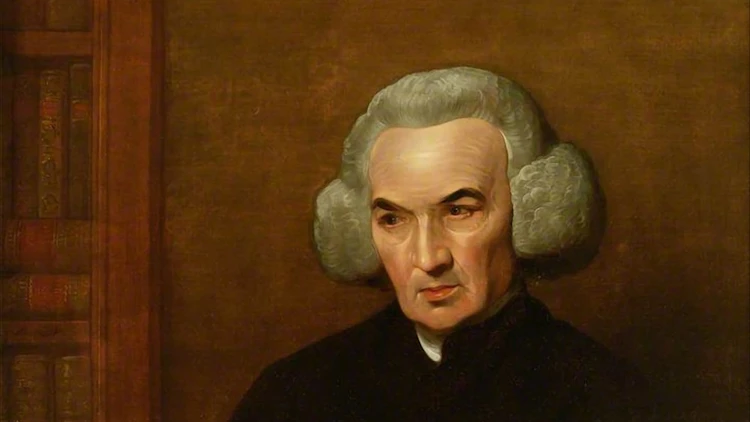Huw L Williams celebrates the tercentenary of the birth of Richard Price, who he calls ‘our greatest thinker’.
As an Enlightenment intellectual, Richard Price’s worldview was very similar to the greatest philosopher of his era, Immanuel Kant. Both shared a very similar cosmopolitan political vision that rejected a more Machiavellian or Realist view of international politics. Their ideals were instead firmly rooted in their moral philosophy, and indeed Price is said to have prefigured some of Kant’s key philosophical ideas in his major text on Ethics in 1758.
A Review of the Principle Questions in Morals rejected the Empiricism of figures such as David Hume that had established itself as the mainstream. Whilst his book assured Price’s name among British intellectuals of the time, it also set him apart. He took a moral position more often associated with continental contemporaries. In short, Price rejected the Humean idea that our view of the good is informed by our experience and emotional response to the world. Rather, it is informed by our moral sensibility and ability to perceive and understand objective, universal moral truths.
A polymath and public intellectual, Richard Price made contributions to various fields including theology, mathematics and science
Whilst Kant’s reputation is built purely on his philosophy, Price was an intellectual giant of a different kind. A polymath and public intellectual, he made contributions to various fields including theology, mathematics and science. Among his achievements was establishing Bayes’ theorem on probability. On account of his deep concern for protecting people from life’s misfortunes, he contributed towards some of the formative principles of the field of insurance with his tireless work (an obvious example of how his life’s work must be understood through the lens of his religious convictions). He influenced political economy through his work on the national debt, and his reputation was enough for him to receive an invitation from the new government of the United States to manage their finances.
But above all his it was his contribution in the field of politics that cemented his international reputation and led those who wrote his obituaries to declare that he would be remembered alongside Jefferson and Lafayette. In those pamphlets, which supported the American War of Independence and the outbreak of Revolution in France (he died in 1791 before the descent into the Terror) a radical, republican view emerges. The most famous of these texts is the Discourse on the Love of Our Country, published in 1789 at the dawn of the French Revolution.
In it Price expresses support for the Revolution on the grounds that it represents the spirit of the Glorious Revolution in 1688, when James II was deposed and replaced by Williams of Orange. Price claimed that that particular revolution established the right of freedom of religion, the right to resist the abuse of power and the right to choose those who govern us – and to dismiss them.
Syniadau uchelgeisiol, awdurdodol a mentrus.
Ymunwch â ni i gyfrannu at wneud Cymru gwell.
The pamphlet would precipitate the Revolution Controversy, an exchange of political views over the following decade that is widely regarded as the most important and formative in modern politics. Some will have you believe that this began with Edmund Burke and his Reflections on the French Revolution, but in fact it was Price who started it all – compelling Burke to respond both because of who he was and what he was saying. In particular Burke was afraid of this preeminent radical and dissenter allying the progressive forces of France and Britain. That might have swept away the hierarchy of the British State.
It was more, however, than a rallying cry. It was also a mature statement of the most important aspects of his political philosophy, presenting arguments and themes that resonate across the ages. The first of those – often unrecognised – is that Price, in my view, provided one of the earliest statements of Civic Nationalism. This concept is conceived traditionally in contrast to ‘ethnic’ nationalism and argues that the basis of a nation, and one’s membership, is its political institutions, legal order and rights that issue from it, and that our citizenship is based on our contribution towards their maintenance and functioning. This is contrasted with ‘ethnic’ nationalism that is said to advocate features such as race, ethnicity, language, culture and tradition as the basis for the nation and membership thereof.
These categories have been deployed ideologically, as shorthand to portray some nationalities as ‘good’, ‘open’ and ‘tolerant’ (western democracies as civic nations) and other nationalities as ‘narrow’ ‘exclusionary’ and ‘racist’ (for example, the emerging nations of the former Soviet Bloc). Or closer to home, Welsh and Scottish nationalism as ‘ethnic’ and British nationalism as ‘civic’. The truth, however, is that most nations promote a mix of both – where some factors become more salient depending on the context. In particular, recent years in the UK have revealed – through the Windrush Scandal, the discourse of Brexit and the current treatment of asylum seekers – that never far below the alleged British ‘civic’ identity lurks a far more aggressive form of white, anglophone, Christian ethnic nationalism.
Price’s position in the world can be used to explain why he should advocate a new, civic tradition. He was a dissenting minister in Newington Green and part of the nonconformist tradition, in opposition to the Church of England. Nonconformists were subject to the Test Laws that meant they were effectively second class citizens. He was also of course a Welshman, and very likely Welsh-speaking, therefore hailing from what is sometimes referred to as ‘the Celtic fringe’. In my mind we can regard Price’s articulation of an early form of civic nationalism as an ideal that he would have considered crucial in extending full membership and participation across the New Britain, beyond the established elite.
This was an elite that would, through the likes of Edmund Burke, win the day and, according to the historian J.C.D. Clark, ensure that the British state would develop in accordance with its historic, ethnic anglophone aristocratic identity. This victory, we may suggest, continues to influence the political shape of modern Britain.
Recent years in the UK have revealed – through the Windrush Scandal, the discourse of Brexit and the current treatment of asylum seekers – that never far below the alleged British ‘civic’ identity lurks a far more aggressive form of white, anglophone, Christian ethnic nationalism.
Price’s ideal of civic nationalism must also be considered in its context: as part of a wider set of ideas around nationalism. Indeed one of the main aims of the pamphlet is to express how nationalism can only be valid and legitimate when it is expressed within the broader context of global relations and is curtailed by reason and a sympathy for our fellow human beings. Civic nationalism is the basis for this form of patriotism and Price complements it with two other key principles: firstly that love for our country should not mean that we regard ourselves as superior to others, and secondly that all nation states should conduct themselves in the spirit of cooperation and not competition.
These principles lay the basis for what we can call Price’s cosmopolitanism. Part of his support for the American War of Independence related to his anger at the chauvinist attitude of those leading the British Empire at the time. He was also one of the first thinkers of the Enlightenment to advocate for a world federation on the model of the new emerging federation in America, and he truly believed that it was possible over time to establish a peaceful worldwide federation. More generally these sentiments reflect his view that moral virtue should take centre stage in the political sphere, not only in terms of domestic politics but also in terms of global relations as well. Price’s sense of basic humanity and emphasis on freedom would also of course need him to advocate for the abolition of slavery and holding the Americans to account on these matters.
The third defining aspect of Price’s politics is what we might today refer to as his republicanism. Although his republicanism is related in good part to his critique of monarchy and the need for the separation of powers, what is particularly striking is how Price’s particular form of politics is sceptical of those in power and the ill effects of power upon political leaders, which reminds one of the basic anarchist critique: that power corrupts.
Allied to this is his commitment to the idea that we as citizens must be active and not passive. Ultimately it is our duty to challenge our leaders and to hold them to account – not only because this is the only way to ensure good governance, but also because participation in our community in this way is what it means to be human for Price. It is both our privilege and duty as humans to contribute in this way.
What would Price make of today’s politics? It is difficult not to suppose that he would be crestfallen at the decline of the UK, and would be advocating similar sentiments in terms of the people needing to stand up for their rights. He was in some senses a big Brit – he had great hopes for this new nation in which he had grown up, and that it would be the harbinger of freedom and democracy. Nevertheless, even in his own lifetime he had become frustrated with its lack of development and by the 1780s, Patrick Spero (Librarian of the American Philosophical Association) suggests he’d lost a great deal of hope, and that he expressed his own ‘declaration of independence’ when he wrote to Jefferson in a letter: ‘I have learnt to consider myself more as a citizen of the world than of any particular country, and to such a person every advance that the cause of public liberty makes must be agreeable.’
It is likely he would have supported devolution, as someone who was in favour of the greatest possible citizen involvement and direct democracy where possible
From this view Price was ready to support the cause of equality and liberty wherever it arose. Again as Spero asserted, it is likely he would have supported devolution, as someone who was in favour of the greatest possible citizen involvement and direct democracy where possible – the closer the government to the people the better. In terms of Welsh independence, he extolled what he called ‘civil liberty’ – namely self-determination of a political community – but as a civic nationalist he would not have regarded ‘difference’ as a reason in itself, where effective civic institutions were possible. However, it is quite possible on that basis that his declaration of independence would have been equally relevant to today’s UK, and as such a revolution in democratic values in his native Wales might well have brought him to the cause.
Ultimately, however, even in such a scenario it is important to return to the type of patriotism and therefore separatism he would avow, by remembering his commitment to cooperation and mutual respect, and also his hopes for a world federation. Any such independence would be one that sought connections with others on an international level and cooperation where any common concerns were clear. ‘The noblest principle in our nature is the regard to general justice, and that good-will which embraces all the world,’ he wrote. And it is always, ultimately, in Price’s politics, the general good of mankind that should prevail.
- Huw L Williams is a political philosopher, interested in egalitarian and radical traditions of thought, with a particular focus on engaging with activism and the public sphere. He is Dean for the Welsh Language, Reader in Philosophy and Associate Lecturer with the Coleg Cymraeg Cenedlaethol
This article is drawn from YesCymru’s inaugural St David’s Day lecture. YesCymru is a movement dedicated to the goal of an independent Wales. yes.cymru





